Unit 1 Can you play the guitar?复习课件(共34张PPT)2023-2024学年人教版英语七年级下册
文档属性
| 名称 | Unit 1 Can you play the guitar?复习课件(共34张PPT)2023-2024学年人教版英语七年级下册 | 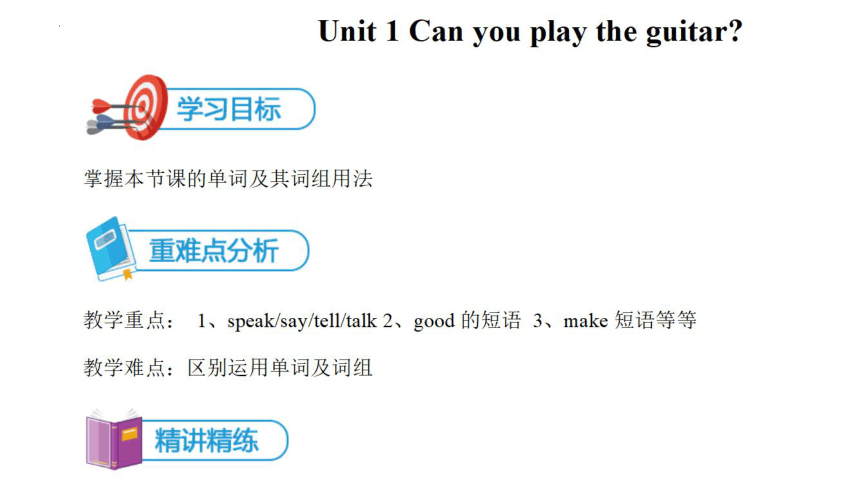 | |
| 格式 | pptx | ||
| 文件大小 | 1.2MB | ||
| 资源类型 | 教案 | ||
| 版本资源 | 人教新目标(Go for it)版 | ||
| 科目 | 英语 | ||
| 更新时间 | 2024-05-08 14:13:58 | ||
图片预览


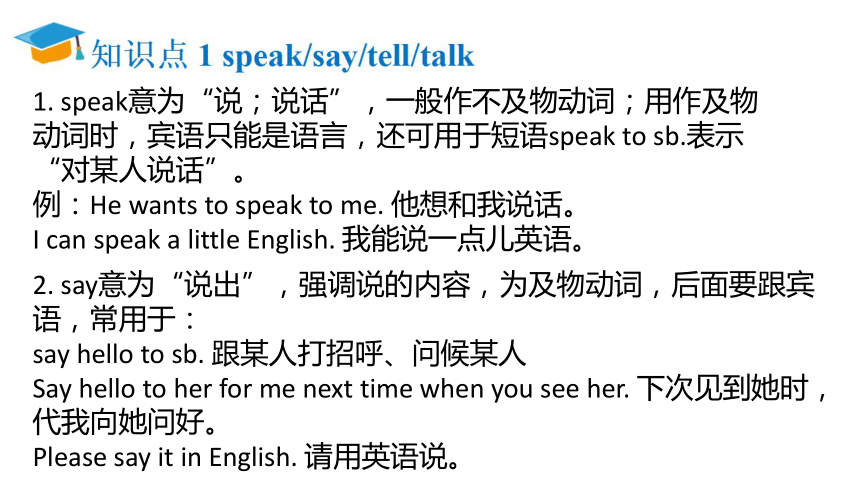
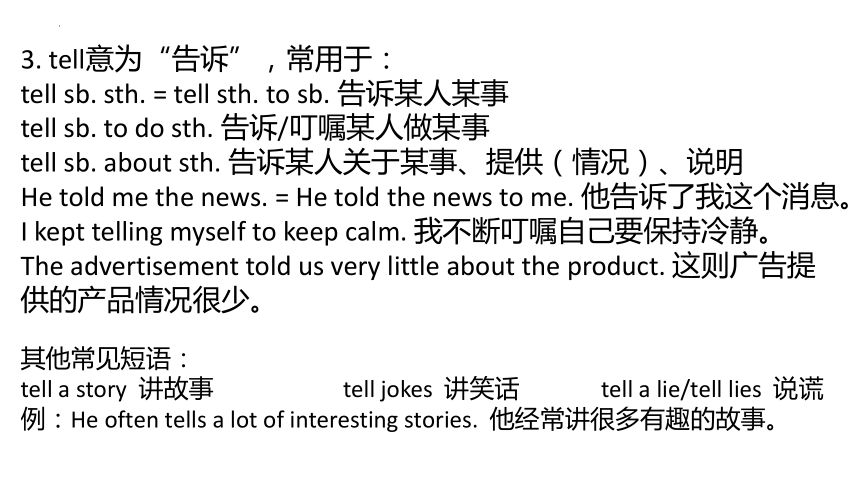
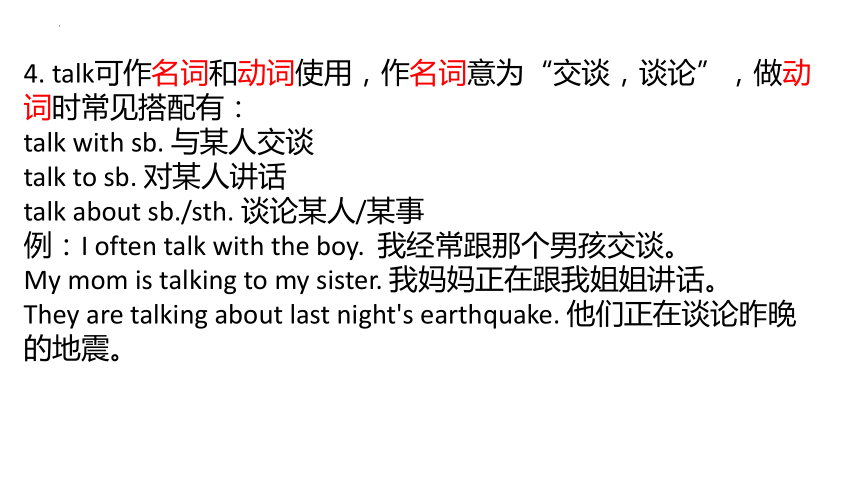
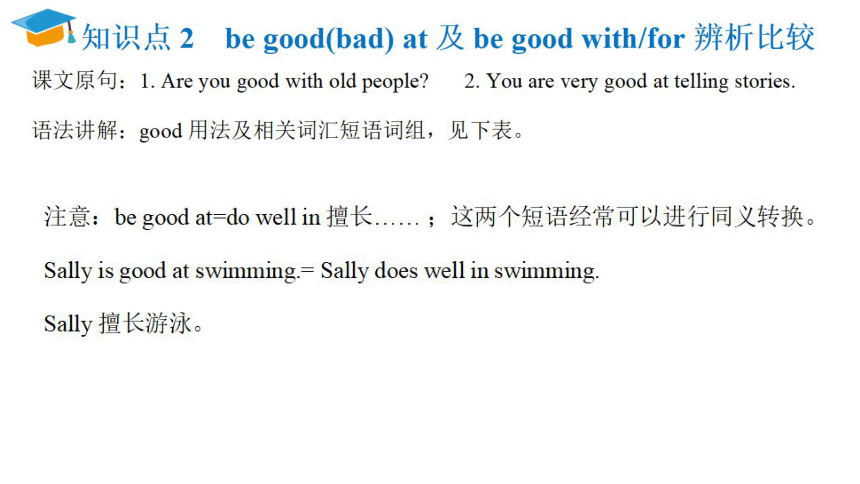
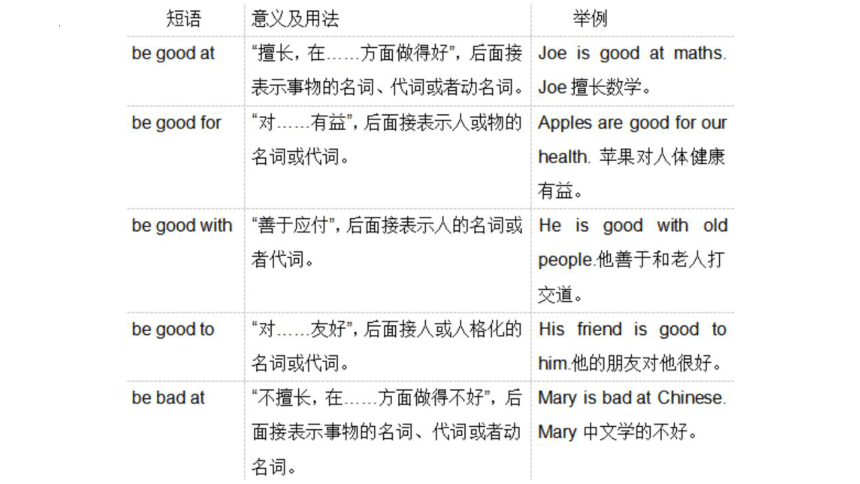

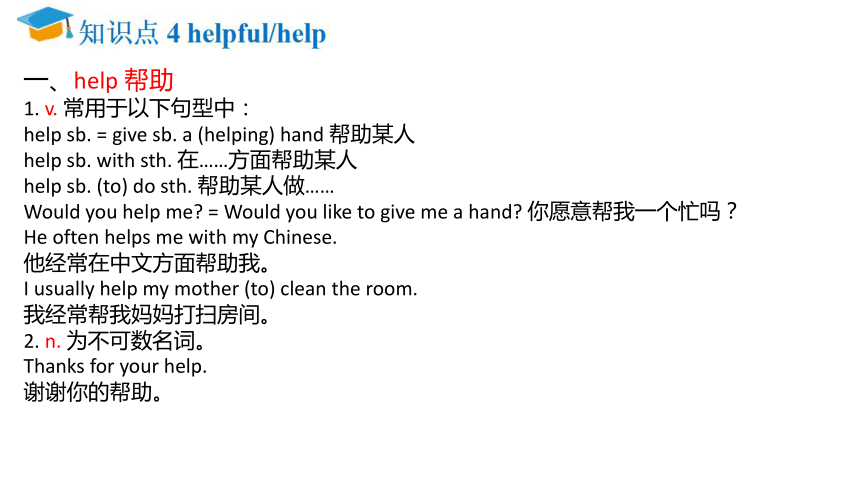
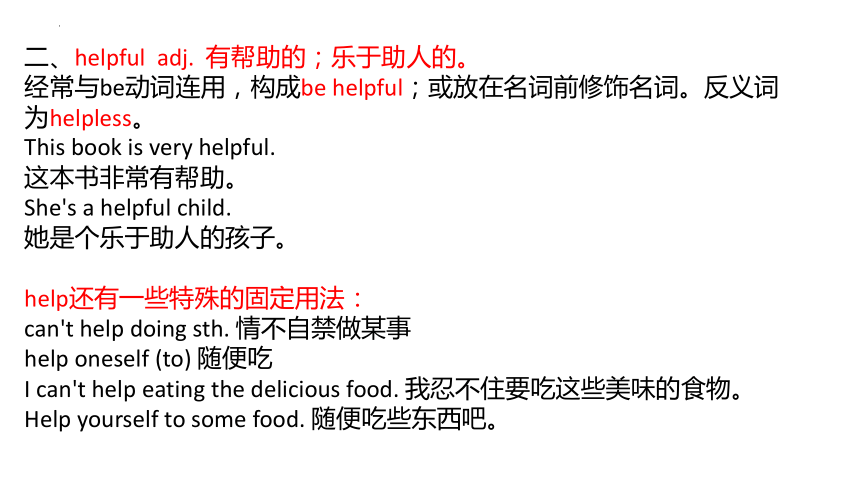
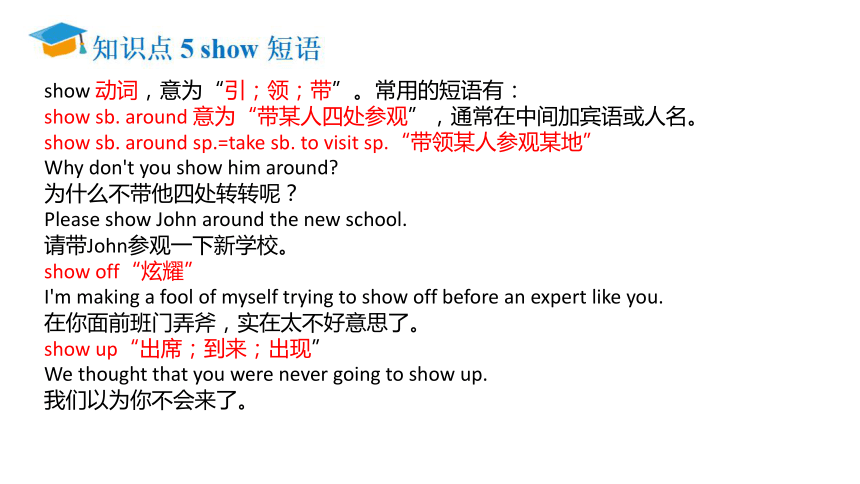
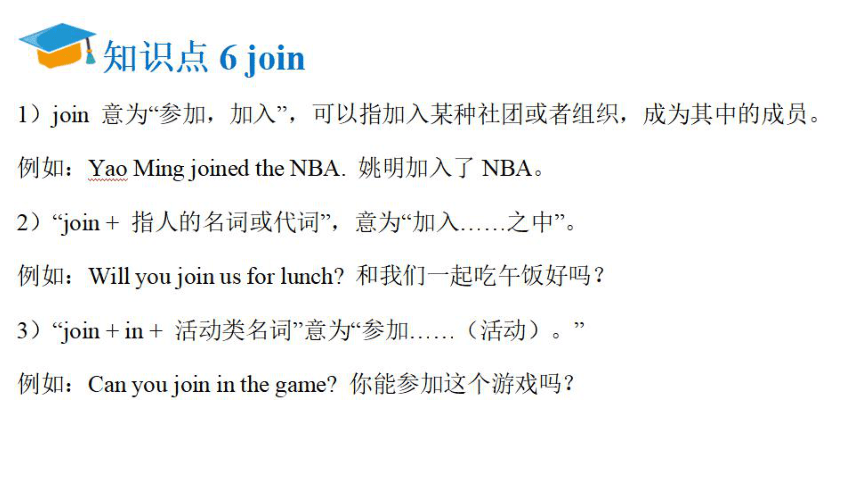
文档简介
(共34张PPT)
1. speak意为“说;说话”,一般作不及物动词;用作及物动词时,宾语只能是语言,还可用于短语speak to sb.表示“对某人说话”。
例:He wants to speak to me. 他想和我说话。
I can speak a little English. 我能说一点儿英语。
2. say意为“说出”,强调说的内容,为及物动词,后面要跟宾语,常用于:
say hello to sb. 跟某人打招呼、问候某人
Say hello to her for me next time when you see her. 下次见到她时,代我向她问好。
Please say it in English. 请用英语说。
3. tell意为“告诉”,常用于:
tell sb. sth. = tell sth. to sb. 告诉某人某事
tell sb. to do sth. 告诉/叮嘱某人做某事
tell sb. about sth. 告诉某人关于某事、提供(情况)、说明
He told me the news. = He told the news to me. 他告诉了我这个消息。
I kept telling myself to keep calm. 我不断叮嘱自己要保持冷静。
The advertisement told us very little about the product. 这则广告提供的产品情况很少。
其他常见短语:
tell a story 讲故事 tell jokes 讲笑话 tell a lie/tell lies 说谎
例:He often tells a lot of interesting stories. 他经常讲很多有趣的故事。
4. talk可作名词和动词使用,作名词意为“交谈,谈论”,做动词时常见搭配有:
talk with sb. 与某人交谈
talk to sb. 对某人讲话
talk about sb./sth. 谈论某人/某事
例:I often talk with the boy. 我经常跟那个男孩交谈。
My mom is talking to my sister. 我妈妈正在跟我姐姐讲话。
They are talking about last night's earthquake. 他们正在谈论昨晚的地震。
make用作动词,意为“使得;制造;做”。其后可跟名词或省略to的不定式作宾语补足语和由形容词、名词、介词短语充当的宾语补足语。
make sth. 做某物
make sb. do sth. 使某人做某事
make sb./sth.+adj. 使某人或某物……
make the bed 整理床铺
Can you make mooncakes
你会做月饼吗?
Don't make the baby cry anymore.
别再让宝宝哭了。
Noise makes my ears uncomfortable.
噪音让我的耳朵不舒服。
You should try to make the bed by yourself.
你应该试着自己整理床铺。
一、help 帮助
1. v. 常用于以下句型中:
help sb. = give sb. a (helping) hand 帮助某人
help sb. with sth. 在……方面帮助某人
help sb. (to) do sth. 帮助某人做……
Would you help me = Would you like to give me a hand 你愿意帮我一个忙吗?
He often helps me with my Chinese.
他经常在中文方面帮助我。
I usually help my mother (to) clean the room.
我经常帮我妈妈打扫房间。
2. n. 为不可数名词。
Thanks for your help.
谢谢你的帮助。
二、helpful adj. 有帮助的;乐于助人的。
经常与be动词连用,构成be helpful;或放在名词前修饰名词。反义词为helpless。
This book is very helpful.
这本书非常有帮助。
She's a helpful child.
她是个乐于助人的孩子。
help还有一些特殊的固定用法:
can't help doing sth. 情不自禁做某事
help oneself (to) 随便吃
I can't help eating the delicious food. 我忍不住要吃这些美味的食物。
Help yourself to some food. 随便吃些东西吧。
show 动词,意为“引;领;带”。常用的短语有:
show sb. around 意为“带某人四处参观”,通常在中间加宾语或人名。
show sb. around sp.=take sb. to visit sp.“带领某人参观某地”
Why don't you show him around
为什么不带他四处转转呢?
Please show John around the new school.
请带John参观一下新学校。
show off“炫耀”
I'm making a fool of myself trying to show off before an expert like you.
在你面前班门弄斧,实在太不好意思了。
show up“出席;到来;出现”
We thought that you were never going to show up.
我们以为你不会来了。
1)本句中的特殊疑问词what在句子中起形容词的作用,后面用名词构成句型“What+名词+一般疑问句?”,是对主语、宾语和表语进行提问。what可以提问人物的身份、姓名、内容、性质和类别,也可以提问事物的目的、价格、数量和效果。
例如:What class are you in 你在几班?
What color is your bike 你的自行车是什么颜色的?
2)want to do sth. 意为“想要做某事”。
例如:I want to join the swimming club. 我想加入游泳俱乐部。
want的其他常见用法有:
want sth. 想要某物
例如:She wants a pen. 她想要一支钢笔。
② want sb. to do sth. 想要某人做某事
例如:He wants me to play with him. 他想让我和他一起玩。
3)want 还有“招聘,诚聘”的意思。
例如:Musician wanted for School Music Festival. 学校音乐节招聘音乐人才。
Ⅱ. 按要求完成句子。
1. I can play the guitar. (变一般疑问句)
______ ______ play the guitar
2. I want to join the chess club.(对画线部分提问)
______ club ______ you ______ to join
3. He can paint. (对画线部分提问)
_______ _______ he ________
4. Can we take it to the classroom (作否定回答)
_______ , _______ ________.
5. He is a student. (改成复数句子)
_______ _______ students.
6. My brother can be good with his classmates. (改为否定句)
My brother ______ ______ good with his classmates.
7. I want to take the books to the room. (改为否定句)
I _______ _______ to take the books to the room.
8. Can you help kids learn swimming (改为同义句)
Can you help kids ______ ______
9. Please show me your new watch.(改为同义句)
Please show your new watch _____ _____.
10. Lucy’s brother want to be an actor. (改为一般疑问句)
______ Lucy’s brother ______ to be an actor
Ⅱ. 按要求完成句子。
1. Can you
2. Which / What, do, want
3. What, can, do
4. No, you, can’t
5. They, are
6. can’t, be
7. don’t, want
8. with, swimming
9. to, me
10. Does, want
(1)表示球类、棋类的名词前不加冠词。
如:play football 踢足球 play volleyball 打排球 play chess 下象棋
Why don't we play football on the playground
我们为什么不在操场上踢足球呢?
Do you like playing chess or table tennis
你喜欢下象棋还是打乒乓球?
(2)西方乐器名称的前面需加定冠词the,如:
play the guitar 弹吉他 play the piano 弹钢琴
play the violin 拉小提琴 play the drums 打鼓
They can play the piano. 他们会弹钢琴。
We're learning to play the guitar by ourselves. 我们在自学吉他。
我们可以用情态动词表示允许和能力。
情态动词can表示现在的能力,could表示过去的某种能力。例:
He can speak good English. Sandy cannot dance.
The old man could swim across the river when he was young.
注意:我们也可以用be able to来表示能力,be动词的形式根据句子所用时态变化。例:
My little sister is able to look after herself now.
My little sister wasn't able to look after herself when she was 5 years old.
一般疑问句:将can置于句首并大写首字母,再加上句子的其他成分,即可构成can的一般疑问句,回答方式与其他一般疑问句相同。
-Can I use your pen -我可以用你的钢笔吗?
-Yes, of course you can. -当然可以。
-Can you draw -你会画画吗?
-Yes, I can./No, I can't. -是的,我会。/不,我不会。
特别要注意can的否定形式为cannot/can't,can’t是cannot的缩写。
1.what的用法
疑问词what引导的特殊疑问句,询问事物内容或者人的职业。此类疑问句可以对主语、表语和宾语提问。
A. 对主语提问
例:What is in your pocket 你口袋里有什么?
这个问题可以有两种回答:
a:There is an egg in it. 在口袋里有一个蛋。
b:An egg (is in it). 一个蛋(在里面)。
注意:回答此句型的问题时,答句的单复数根据实际情况而定。
B. 对宾语提问
例:-What did you buy -你买了什么? -I bought a bike. -我买了辆自行车。
C.对表语提问
例:-What is this -这是什么? -It's a bench. -这是一条长凳。
-What is your mother -你妈妈是干什么的? -She is a teacher. 她是一名老师。
注意:询问人职业的句型。What is+人 /What is sb’s job /What does/do sb. do
2.which的用法
which用作疑问代词,意为“哪一个”、“哪一些”,在句子中作主语、宾语、表语等,可引导选择疑问句。
例:Which is the best student in your class
你们班上学习最好的学生是哪个?
例:Which subject do you like best, Chinese, English or maths
你最喜欢哪个科目,语文,英语还是数学?
特殊疑问句是对句子的特定部分提问的疑问句,具体用什么特殊疑问词,需要根据提问对象而确定。特殊疑问句可以由“特殊疑问词+一般疑问句”构成。例如:
Where does he live 他住在哪?
Why do you cry 你为什么哭?
特殊疑问句不能用Yes或No来回答,须用完整的句子或根据具体情况用省略句来回答,并且回答应与上文的助动词的数保持一致。例如:
-When do you usually do your homework
-你通常什么时候做家庭作业?
-I usually do my homework at 7 o'clock.
-我通常7点做我的家庭作业。
1. speak意为“说;说话”,一般作不及物动词;用作及物动词时,宾语只能是语言,还可用于短语speak to sb.表示“对某人说话”。
例:He wants to speak to me. 他想和我说话。
I can speak a little English. 我能说一点儿英语。
2. say意为“说出”,强调说的内容,为及物动词,后面要跟宾语,常用于:
say hello to sb. 跟某人打招呼、问候某人
Say hello to her for me next time when you see her. 下次见到她时,代我向她问好。
Please say it in English. 请用英语说。
3. tell意为“告诉”,常用于:
tell sb. sth. = tell sth. to sb. 告诉某人某事
tell sb. to do sth. 告诉/叮嘱某人做某事
tell sb. about sth. 告诉某人关于某事、提供(情况)、说明
He told me the news. = He told the news to me. 他告诉了我这个消息。
I kept telling myself to keep calm. 我不断叮嘱自己要保持冷静。
The advertisement told us very little about the product. 这则广告提供的产品情况很少。
其他常见短语:
tell a story 讲故事 tell jokes 讲笑话 tell a lie/tell lies 说谎
例:He often tells a lot of interesting stories. 他经常讲很多有趣的故事。
4. talk可作名词和动词使用,作名词意为“交谈,谈论”,做动词时常见搭配有:
talk with sb. 与某人交谈
talk to sb. 对某人讲话
talk about sb./sth. 谈论某人/某事
例:I often talk with the boy. 我经常跟那个男孩交谈。
My mom is talking to my sister. 我妈妈正在跟我姐姐讲话。
They are talking about last night's earthquake. 他们正在谈论昨晚的地震。
make用作动词,意为“使得;制造;做”。其后可跟名词或省略to的不定式作宾语补足语和由形容词、名词、介词短语充当的宾语补足语。
make sth. 做某物
make sb. do sth. 使某人做某事
make sb./sth.+adj. 使某人或某物……
make the bed 整理床铺
Can you make mooncakes
你会做月饼吗?
Don't make the baby cry anymore.
别再让宝宝哭了。
Noise makes my ears uncomfortable.
噪音让我的耳朵不舒服。
You should try to make the bed by yourself.
你应该试着自己整理床铺。
一、help 帮助
1. v. 常用于以下句型中:
help sb. = give sb. a (helping) hand 帮助某人
help sb. with sth. 在……方面帮助某人
help sb. (to) do sth. 帮助某人做……
Would you help me = Would you like to give me a hand 你愿意帮我一个忙吗?
He often helps me with my Chinese.
他经常在中文方面帮助我。
I usually help my mother (to) clean the room.
我经常帮我妈妈打扫房间。
2. n. 为不可数名词。
Thanks for your help.
谢谢你的帮助。
二、helpful adj. 有帮助的;乐于助人的。
经常与be动词连用,构成be helpful;或放在名词前修饰名词。反义词为helpless。
This book is very helpful.
这本书非常有帮助。
She's a helpful child.
她是个乐于助人的孩子。
help还有一些特殊的固定用法:
can't help doing sth. 情不自禁做某事
help oneself (to) 随便吃
I can't help eating the delicious food. 我忍不住要吃这些美味的食物。
Help yourself to some food. 随便吃些东西吧。
show 动词,意为“引;领;带”。常用的短语有:
show sb. around 意为“带某人四处参观”,通常在中间加宾语或人名。
show sb. around sp.=take sb. to visit sp.“带领某人参观某地”
Why don't you show him around
为什么不带他四处转转呢?
Please show John around the new school.
请带John参观一下新学校。
show off“炫耀”
I'm making a fool of myself trying to show off before an expert like you.
在你面前班门弄斧,实在太不好意思了。
show up“出席;到来;出现”
We thought that you were never going to show up.
我们以为你不会来了。
1)本句中的特殊疑问词what在句子中起形容词的作用,后面用名词构成句型“What+名词+一般疑问句?”,是对主语、宾语和表语进行提问。what可以提问人物的身份、姓名、内容、性质和类别,也可以提问事物的目的、价格、数量和效果。
例如:What class are you in 你在几班?
What color is your bike 你的自行车是什么颜色的?
2)want to do sth. 意为“想要做某事”。
例如:I want to join the swimming club. 我想加入游泳俱乐部。
want的其他常见用法有:
want sth. 想要某物
例如:She wants a pen. 她想要一支钢笔。
② want sb. to do sth. 想要某人做某事
例如:He wants me to play with him. 他想让我和他一起玩。
3)want 还有“招聘,诚聘”的意思。
例如:Musician wanted for School Music Festival. 学校音乐节招聘音乐人才。
Ⅱ. 按要求完成句子。
1. I can play the guitar. (变一般疑问句)
______ ______ play the guitar
2. I want to join the chess club.(对画线部分提问)
______ club ______ you ______ to join
3. He can paint. (对画线部分提问)
_______ _______ he ________
4. Can we take it to the classroom (作否定回答)
_______ , _______ ________.
5. He is a student. (改成复数句子)
_______ _______ students.
6. My brother can be good with his classmates. (改为否定句)
My brother ______ ______ good with his classmates.
7. I want to take the books to the room. (改为否定句)
I _______ _______ to take the books to the room.
8. Can you help kids learn swimming (改为同义句)
Can you help kids ______ ______
9. Please show me your new watch.(改为同义句)
Please show your new watch _____ _____.
10. Lucy’s brother want to be an actor. (改为一般疑问句)
______ Lucy’s brother ______ to be an actor
Ⅱ. 按要求完成句子。
1. Can you
2. Which / What, do, want
3. What, can, do
4. No, you, can’t
5. They, are
6. can’t, be
7. don’t, want
8. with, swimming
9. to, me
10. Does, want
(1)表示球类、棋类的名词前不加冠词。
如:play football 踢足球 play volleyball 打排球 play chess 下象棋
Why don't we play football on the playground
我们为什么不在操场上踢足球呢?
Do you like playing chess or table tennis
你喜欢下象棋还是打乒乓球?
(2)西方乐器名称的前面需加定冠词the,如:
play the guitar 弹吉他 play the piano 弹钢琴
play the violin 拉小提琴 play the drums 打鼓
They can play the piano. 他们会弹钢琴。
We're learning to play the guitar by ourselves. 我们在自学吉他。
我们可以用情态动词表示允许和能力。
情态动词can表示现在的能力,could表示过去的某种能力。例:
He can speak good English. Sandy cannot dance.
The old man could swim across the river when he was young.
注意:我们也可以用be able to来表示能力,be动词的形式根据句子所用时态变化。例:
My little sister is able to look after herself now.
My little sister wasn't able to look after herself when she was 5 years old.
一般疑问句:将can置于句首并大写首字母,再加上句子的其他成分,即可构成can的一般疑问句,回答方式与其他一般疑问句相同。
-Can I use your pen -我可以用你的钢笔吗?
-Yes, of course you can. -当然可以。
-Can you draw -你会画画吗?
-Yes, I can./No, I can't. -是的,我会。/不,我不会。
特别要注意can的否定形式为cannot/can't,can’t是cannot的缩写。
1.what的用法
疑问词what引导的特殊疑问句,询问事物内容或者人的职业。此类疑问句可以对主语、表语和宾语提问。
A. 对主语提问
例:What is in your pocket 你口袋里有什么?
这个问题可以有两种回答:
a:There is an egg in it. 在口袋里有一个蛋。
b:An egg (is in it). 一个蛋(在里面)。
注意:回答此句型的问题时,答句的单复数根据实际情况而定。
B. 对宾语提问
例:-What did you buy -你买了什么? -I bought a bike. -我买了辆自行车。
C.对表语提问
例:-What is this -这是什么? -It's a bench. -这是一条长凳。
-What is your mother -你妈妈是干什么的? -She is a teacher. 她是一名老师。
注意:询问人职业的句型。What is+人 /What is sb’s job /What does/do sb. do
2.which的用法
which用作疑问代词,意为“哪一个”、“哪一些”,在句子中作主语、宾语、表语等,可引导选择疑问句。
例:Which is the best student in your class
你们班上学习最好的学生是哪个?
例:Which subject do you like best, Chinese, English or maths
你最喜欢哪个科目,语文,英语还是数学?
特殊疑问句是对句子的特定部分提问的疑问句,具体用什么特殊疑问词,需要根据提问对象而确定。特殊疑问句可以由“特殊疑问词+一般疑问句”构成。例如:
Where does he live 他住在哪?
Why do you cry 你为什么哭?
特殊疑问句不能用Yes或No来回答,须用完整的句子或根据具体情况用省略句来回答,并且回答应与上文的助动词的数保持一致。例如:
-When do you usually do your homework
-你通常什么时候做家庭作业?
-I usually do my homework at 7 o'clock.
-我通常7点做我的家庭作业。
同课章节目录
- Unit 1 Can you play the guitar?
- Section A
- Section B
- Unit 2 What time do you go to school?
- Section A
- Section B
- Unit 3 How do you get to school?
- Section A
- Section B
- Unit 4 Don't eat in class.
- Section A
- Section B
- Unit 5 Why do you like pandas?
- Section A
- Section B
- Unit 6 I'm watching TV.
- Section A
- Section B
- Review of Units 1-6
- Unit 7 It's raining!
- Section A
- Section B
- Unit 8 Is there a post office near here?
- Section A
- Section B
- Unit 9 What does he look like?
- Section A
- Section B
- Unit 10 I'd like some noodles.
- Section A
- Section B
- Unit 11 How was your school trip?
- Section A
- Section B
- Unit 12 What did you do last weekend?
- Section A
- Section B
